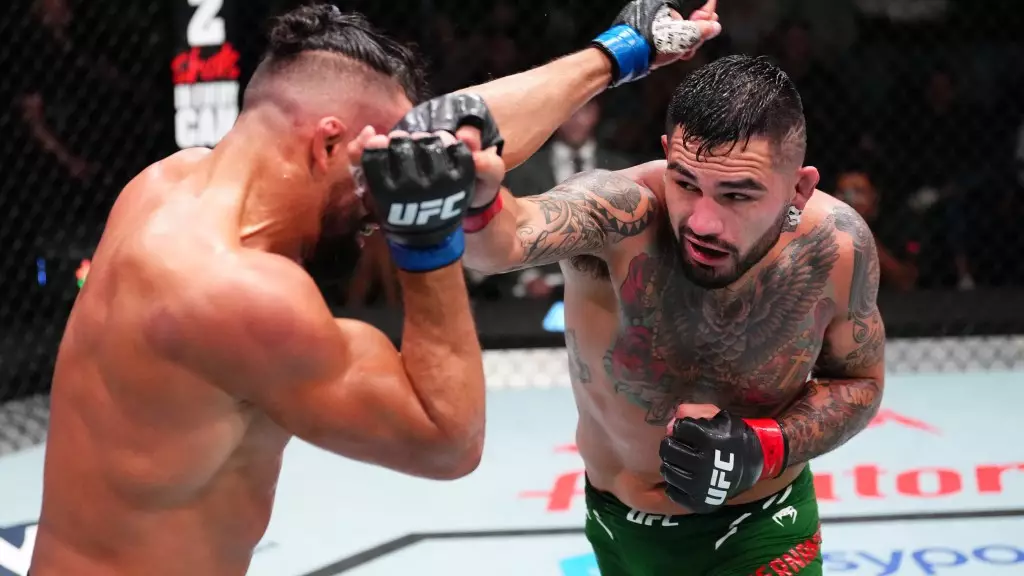UFC Fight Night 245 showcased a remarkable evening of mixed martial arts at the UFC Apex in Las Vegas, highlighting the unpredictable nature of the sport. With nine out of 11 bouts reaching the judges’ scorecards, the event drew intrigue but also criticism regarding fighter performance and the importance of finishing fights. However, a few fighters elevated the excitement, notably Anthony Hernandez, whose grandeur showcased why he’s poised for greater contention in the middleweight division.
Anthony Hernandez: A Stellar Performance
The headliner fight featured Anthony Hernandez, who delivered an extraordinary display of martial artistry against Michel Pereira. Hernandez’s fifth-round TKO victory was not just a win but a statement that solidified his position as a key player in the middleweight landscape. This performance was marked by a staggering accumulation of 128 significant strikes landed, a single-fight middleweight record. Moreover, Hernandez showcased his wrestling prowess with an unprecedented 29 takedown attempts, another record-setting feat in the UFC middleweight division.
Hernandez’s ability to outstrike Pereira by such a significant margin underlines not only his striking accuracy but also his tactical superiority throughout the fight. Each round built up to a crescendo that culminated in the TKO, further establishing Hernandez as a formidable opponent and enhancing his reputation in a highly competitive weight class. With his sixth consecutive victory in the UFC, he now ranks third in terms of the longest active winning streak in the middleweight division.
Despite Hernandez’s electrifying finish, the overall event was characterized by a notable reliance on judges to determine outcomes. Out of 11 fights, an overwhelming majority ended in decisions, sparking dialogue around the need for fighters to increase their finish rates. While some competitors demonstrated resilience and skill over three rounds, it often left fans yearning for the explosive finishes that define mixed martial arts.
The decision-heavy nature of UFC Fight Night 245 highlighted the contrasting styles and strategies employed throughout the card. Some fighters opted for calculated striking exchanges, while others leaned heavily into grappling tactics. The outcomes illustrate the necessity for athletes to be versatile and unpredictable, as stagnation can lead to unexciting fights. This reliance on judges can shift the narrative around fighters, often overshadowing an impressive skill set if they cannot secure a finish.
One of the compelling narratives from the fight card involved Rob Font, who pulled off a comeback victory after facing two consecutive defeats. This win not only revitalized Font’s career but highlighted the cyclical nature of success in MMA, where resilience can pay off in the often brutal and unforgiving octagon. In contrast, fighters like Kyler Phillips and Jake Hadley experienced the opposite end of the spectrum, encountering challenges in securing wins, which has implications for their future standings within the organization.
Moreover, notable achievements emerged even amidst close decision losses. Charles Johnson secured his fourth UFC victory, tying for the second-longest streak in the flyweight class. These individual arcs within the event underscored how UFC records evolve continuously, with each fighter’s journey contributing to the broader narrative of the sport.
UFC Fight Night 245 ultimately served as a double-edged sword, balancing record-setting performances against a backdrop of decision-heavy bouts. Anthony Hernandez’s rise positions him as a serious contender in the middleweight division, while the overall reliance on judges overshadows the event’s electric moments.
As the promotion progresses into the next bouts, there will be a critical examination of fighter performances, strategies, and the importance of finishing fights. Each athlete stepping into the octagon carries the heavy mantle of delivering not just victories but memorable moments for fans, sponsors, and the sport itself. The question remains: how will fighters adapt their strategies moving forward to ensure that they leave lasting impressions and not just rely on scorecards to dictate their futures? The answer lies in their willingness to embrace risk, creativity, and the relentless pursuit of victory in an unpredictable and fiercely competitive arena.

